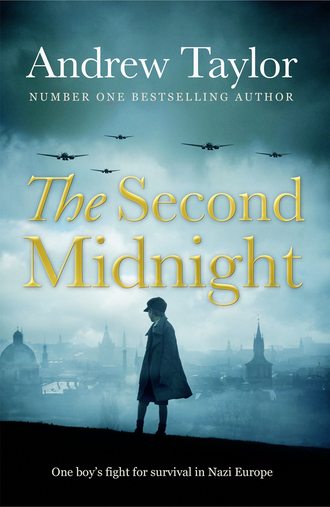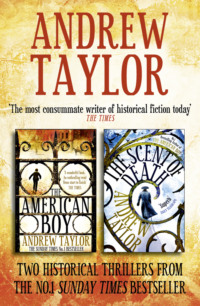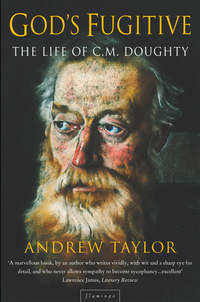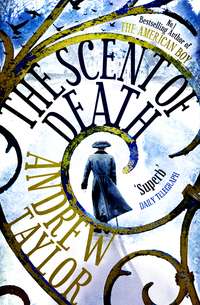
Полная версия
The Second Midnight
‘What will he do with you now? Has he found you another school?’
‘I don’t know.’ Hugh avoided Mrs Bunnings’s eyes. His fingers traced the reassuring shape of Hiawatha in his trouser pocket.
‘Father says that if Hugh was a few years older he’d pack him off to Australia and have done with him.’ Under the table, Meg put her hand on Hugh’s knee; it made him shiver. ‘He really means it.’
Hugh shifted uneasily. Sitting down was still uncomfortable and he wished Meg would remove her hand. Mrs Bunnings might see. The long, low kitchen was like a hothouse; Mrs Bunnings had insisted on keeping the old-fashioned range. The heat, the food and even the sympathy combined to make him feel drowsy.
A bell jangled over the door. It was precisely twenty minutes after they had entered the house. Mr Kendall always timed their visits with meticulous care. At the end of the twenty minutes, he would stand up and announce they had to be going, usually when his wife was in mid-sentence.
Mrs Bunnings escorted the children back to the drawing room to say goodbye. Mr Kendall was waiting impatiently by the door. Hugh had often wondered why his father seemed always to be in a hurry to be somewhere else; when he reached the somewhere else, he was always in a hurry to leave there as well.
For once, Aunt Vida seemed reluctant to let them go. She made Mr Kendall make up the fire for her. She suddenly remembered that she wanted her niece to get her some wool; the commission involved a great deal of explanation, during which Mr Kendall jabbed angrily at the fire with the poker. He consulted his watch.
‘We shall miss the train if we don’t hurry.’
‘Off you go then.’ Aunt Vida paused. ‘Hugh, come over here. I want a word with you.’
Alfred Kendall turned in the doorway.
‘Hugh can run after you,’ Aunt Vida said firmly, before he could protest. ‘Please close the door behind you.’
Kendall gnawed his lower lip but said nothing. He shut the door behind him; with a little more force, it would have been a slam.
Aunt Vida beckoned Hugh towards her. ‘I hear you’ve been in hot water again.’
Hugh nodded. There was nothing he could say.
‘Bring me my handbag. It’s on the bureau.’
Like his father, Aunt Vida was always giving orders; Hugh found it odd that he wasn’t afraid of her. His parents and Meg were afraid of her – even Stephen was wary of what he said and did in her company. He fetched her the battered black bag and stood patiently while she rummaged in it. He watched her face with fascination: her skin was a maze of wrinkles; there were more cracks than surface.
Suddenly she glanced up at him. ‘Don’t you know it’s rude to stare at a lady? Hey?’
Hugh grinned. He heard the front door closing with a bang; Mrs Bunnings was glad to see the back of her visitors.
Aunt Vida nodded in the direction of the sound. ‘Don’t let it get on top of you,’ she said gruffly. ‘These things pass. Worse things happen at sea, not that that’s much consolation. When your father asks why I kept you, say I was telling you to be a better boy in future. Here, hold out your hand.’
Hugh looked down. On his palm was a half-crown.
‘Kendall?’ Colonel Dansey stared with distaste at his plate; it was difficult to tell whether it was the omelette or the name of Kendall that was responsible for the irritation in his voice. ‘Who the devil’s he?’
‘He’s a glass importer, sir.’ Michael Stanhope-Smith sipped his burgundy appreciatively. Early in their acquaintance, he had learned that it was a mistake to deluge Uncle Claude with information; Dansey himself never made that mistake and he expected those who worked for him to be equally sparing.
Michael glanced over his shoulder to make sure that no one was in earshot of their table. The dining room at the Savoy was still moderately crowded, but it had definitely passed the Sunday lunchtime peak.
Dansey arranged his knife and fork neatly on his empty plate. He adjusted the dark-rimmed pebble glasses on his large, curved nose. ‘You know that I don’t encourage people to indulge in recruiting off their own bat. Recruit in haste and repent at leisure.’
Michael flushed. He was twenty-five; he was two stone heavier and six inches taller; but Uncle Claude could still make him feel like a schoolboy who hadn’t washed behind the ears.
‘I haven’t actually interviewed him yet. I telephoned him yesterday; we’ve arranged to meet tomorrow.’
‘I see. And why this unseemly haste, may I ask?’
‘You haven’t heard? Farrar’s dead. Apparently he killed himself – sealed the draughts and turned on the gas in his hotel room. The signal came in from Vienna on Friday night.’
Dansey said nothing. He appeared to be concentrating on adjusting the red carnation in the buttonhole of his dark blue suit.
Michael swallowed. ‘William McQueen talked to a waiter at the hotel. He said that Farrar might have had a couple of visitors in his room the evening before he died. Probably Gestapo, though we’ve had no confirmation of that. You know how difficult it is to get hard information out of Austria these days.’
Dansey gave a scarcely perceptible shrug. ‘It’s immaterial. Farrar couldn’t have told them anything. He hadn’t been briefed.’
In the pause which followed, Michael sipped his wine to cover his confusion. It was brutally obvious to him that Dansey didn’t care that Farrar had in all likelihood been killed. It was at most an inconvenience. A newly-recruited courier was of little weight in Uncle Claude’s professional scale of values. If this was professionalism, Michael thought bitterly, he wished he was an amateur.
‘Do go on,’ Dansey suggested. ‘You were about to explain why you found it necessary to circumvent the standard recruitment procedure.’
‘Farrar was due to return to London and then go on to Prague at the end of the week. You said the Prague trip was vital, sir. I would have contacted you, but you were on a train somewhere between Zurich and London. I thought I’d better act on my own initiative.’
‘And how did your initiative lead you to this man Kendall?’
‘We need someone with a bona fide reason to go to Prague – preferably a commercial one. I thought Prague – Bohemia – glass; and then I remembered Sir Basil Cohen.’
‘You know Basil?’ Dansey said sharply. ‘How did that come about?’
‘I was at Cambridge with his younger son. I stayed with his people down in Gloucestershire once or twice.’
‘I see.’ For once Dansey sounded almost amiable.
Michael’s mind immediately made a connection. Cohen had been very helpful, right from the start. Dansey had been cultivating the friendship of the wealthy and the powerful for nearly half a century. Many of them were now unobtrusively helping Dansey’s Z Organization in a variety of ways. It was not inconceivable that Cohen was among them. In that case, Sir Basil must have derived a great deal of private amusement from Michael’s claim that he was working for the Foreign Office trade section.
A muscle twitched in Dansey’s cheek. In a lesser man, it might have been a grin.
‘I telephoned him – luckily he was in town. He was dining at White’s, but he said he could spare me a few minutes there after dinner.’ Michael glanced quickly at Dansey and hurriedly continued: ‘I – well – implied I had some sort of FO connection. I said we needed an unofficial trade representative in Prague – someone who made regular trips there and could combine his own work with a little confidential work for us. Sir Basil asked a few questions, of course, but I was as discreet as possible.’
A waiter moved tentatively towards the table. Dansey waved him away. ‘What do you know about Kendall?’
‘He works from an office in the City. He buys mainly from Czechoslovakia. His main customers in this country are provincial department stores. It’s an old-fashioned firm, run on pre-war lines. Apparently Kendall’s in a bad way financially – Sir Basil reckons he must be on his last legs.’
‘Does Basil know him personally?’
‘They’ve met, sir, but that’s about all. I rather gathered that Kendall isn’t quite …’ Michael’s voice trailed away. He believed that all men were equal but had long since discovered that most of his friends and colleagues paid only lip-service to the notion. He despised snobbery; but he was intelligent enough to realize that it couldn’t be ignored.
Dansey nodded understandingly. ‘Any war record?’
‘Yes, sir; I checked with the War Office. Enlisted in the Pay Corps in 1915 as a private. Commissioned in 1918. He ended the war as an acting captain, after four years behind a desk in Whitehall.’ Michael made his voice as neutral as possible. ‘It seems that he likes to be called Captain Kendall.’
Dansey’s eyebrows rose. ‘Despite the fact he never held a regular commission?’
‘Yes, sir.’
The eyebrows fell back into place. Dansey poured out the last of the burgundy and signalled to the waiter to bring their coffee. He was not in the mood for pudding or cheese and he assumed, correctly, that Michael would be content to follow his lead. By now they were almost alone in the big dining room, except for tail-coated waiters who swooped like swallows among the empty tables, clearing them with deft, darting movements. Michael could feel the hard edges of his sketchbook in the pocket of his jacket. He had a sudden urge to draw what he could see, to record an instant in the life of the Savoy in black and white. He would use lots of heavy shading and soften the outlines as much as possible.
He grinned into his burgundy at the thought of what Dansey would say if he started to draw. It was well known that Dansey considered that the chief purpose of art was to be a tool of espionage: it was a convenient means of creating a visual record of enemy installations. The old man knew that Michael had once wanted to be an artist. What he didn’t know was that Michael still did.
The waiter brought their coffee and withdrew. Dansey produced a cigarette case and offered it to Michael. As Michael lit their cigarettes, he noticed that Dansey’s hand was speckled with brown liver spots and trembled slightly. The hand reminded him that Dansey had already reached the age when most men were thinking of retirement.
‘I’m dining with your godfather tonight,’ Dansey said abruptly.
It was not a social observation. Michael’s godfather, Admiral Sinclair, was head of SIS, the sponsor of Z Organization. If it hadn’t been for Sinclair, it was unlikely that Michael would now be at the Savoy with a decent suit on his back. In all probability he would have been teaching history, art and games at some godforsaken little prep school. Sometimes Michael wished he was.
‘Do give him my regards,’ Michael said.
As always, Dansey’s words had at least two layers of meaning. He was hinting that he would take the opportunity to protect himself in the event of something going wrong with Kendall: Michael was the precooked scapegoat, ready for eating if the need should arise. But there was another implication: Dansey was tacitly accepting what Michael had done; it was the first time that Michael had been allowed to make an independent decision; and that, he supposed, might be construed as progress.
‘You’re meeting Kendall tomorrow?’
‘Yes, sir – for lunch.’
‘If you do decide to take him on, you are to act as his sole control. I want him to have no contact with anyone else in London. He’s not to be given the emergency addresses in Vienna or Budapest or Zurich – is that clear? You can offer him his expenses plus fifty pounds; he can have fifteen pounds now and the rest when he returns. And get receipts.’
‘How much should I tell him?’
‘As little as possible, of course.’ Dansey’s eyebrows rose once more. ‘My dear Stanhope-Smith, surely your artistic temperament hasn’t prevented you from grasping that simple principle? All the man has to do is take something to Prague and bring something back. Unless you’re even more foolish than you look, you won’t mention Hase to him. Just teach Kendall one of the standard recognition drills and tell him to go to his usual hotel. You can then inform Hase of the arrangements independently by telegram. I’m sure you will be able to resist the temptation to wire direct; it really would be much wiser to route it through Zurich and Budapest.’
Michael almost flinched at the quiet savagery which had suddenly invaded Dansey’s voice. At first he was inclined to attribute it to the bitterness which Dansey felt because Michael had been forced on him by Sinclair; then he noticed the lines of pain in Dansey’s forehead and the tiny beads of sweat on his temples. He felt an unexpected stab of pity for the man opposite him: combining a job like his with an ulcer must be an impossible task.
Dansey stubbed out his cigarette, precisely in the centre of the ashtray. Only when the last shred of tobacco was extinguished did he speak again. ‘This is important, you know. There’s very little time. The Czech Deuxième Bureau is really very good. They estimate that Hitler will move within a month – six weeks at the outside. Then there will be no Czechoslovakia – just another province of the Reich. We have to be in place by then.’
‘May I ask a question, sir? If Czech military intelligence is so good, they must be making their own contingency plans. Why aren’t we co-ordinating with them?’
Dansey shrugged wearily. ‘We are. Colonel Moravec and Gibson – he’s the SIS Head-of-Station in Prague, you know – are practically blood-brothers. But Moravec’s an intelligence-gatherer, not a guerrilla chieftain. His idea of a resistance movement is based on the boy scouts – and his political masters think the same. The other problem is geographical: a resistance movement needs a foreign base. Moravec naturally thinks of us and France, though God knows why after what we did to them at Munich. But it’s over two hundred miles between the French and Czechoslovak borders at their nearest points. And that’s as the crow flies across the Reich.’
Michael suddenly understood what Dansey was driving at. ‘But there’s another potential anti-Nazi ally whose border is far closer? And that’s why Hase is so important?’
‘Not just Hase. God help us, even Kendall could be important.’ Dansey’s thin lips twisted. ‘In the circumstances it’s probably just as well you used your initiative.’ He gave Michael no time to savour the unexpected compliment. ‘Where are you intending to have lunch with him?’
‘I thought perhaps the Berkeley Grill. Get him in a good humour.’
‘I think not, Stanhope-Smith. Catering to the sybaritic whims of its junior employees is not one of the purposes of this organization. I’m told that one can find a very decent lunch at a Lyons corner house.’
Dansey pushed back his chair and stood up. The movement triggered a flurry of activity among the waiters near the door. Michael stepped to one side to allow Uncle Claude to precede him.
He glanced at Michael as he passed. ‘I wish you wouldn’t carry a sketchbook in your jacket pocket,’ he observed waspishly. ‘It ruins the cut.’
After dinner on Sunday evening, Mr and Mrs Kendall listened to the news. When it had finished, Kendall prowled through the air waves of Europe.
‘It’s all damned rubbish,’ he said. He turned off the wireless and began to ream a pipe with unnecessary violence.
‘Yes, dear,’ said Mrs Kendall automatically. She decided that now was not the moment to mention the possibility of a rise in her housekeeping allowance.
Kendall rapped the pipe against the side of the ashtray; a small shower of carbon fluttered on to the arm of his chair.
‘I suppose I’ll have to come to some decision about Hugh soon. I’ve always said you spoiled him, Muriel: I hope you’re satisfied. What that boy needs—’
The front door slammed. Mrs Kendall looked up; there was a smile on her face.
‘It’ll be Stephen,’ she said. ‘He’s earlier than usual.’
‘It’s about time he got to bed at a respectable hour.’ Kendall chewed his pipestem. ‘And it’s a bit much, him going out on a Sunday, don’t you think?’
Stephen pushed open the door with a little more force than was necessary. He swayed slightly as he stood in the doorway; Mrs Kendall hoped his father wouldn’t realize he had been drinking.
‘Hello. Any tea left?’ Stephen pulled up a chair to the fire. Mrs Kendall refilled her husband’s cup and poured another for her son.
‘Have you had a nice evening, dear?’
‘I met Paul Bennet up in town.’ Stephen draped an arm along the back of his chair; there was a scowl on his thin, dark face. ‘He’s finally decided to go up to Cambridge this autumn. His father’s promised to give him a car – one of those little MGs.’
Muriel Kendall prayed silently that Stephen would say no more; it would only infuriate his father. Downing College had offered Stephen an exhibition to read modern languages, but he had been unable to take it up because his father refused to find the rest of the fees. The decision had provoked one of the rare open quarrels between Stephen and his father. Her elder son had always been adept at concealing his feelings. Only ambition and, more recently, alcohol allowed one a glimpse of what was going on in his mind.
‘Ridiculous to give a car to a boy that age. When I was nineteen, we thought ourselves lucky to have a bicycle.’
To his mother’s surprise, Stephen said nothing to this. He finished his tea and stared into the fire. His next words were spoken in such a casual tone that Mrs Kendall was immediately suspicious.
‘A lot of chaps at the bank are saying there’s sure to be a war by the end of the year.’
Kendall grunted. ‘They’re probably right.’
‘One or two of them have already joined the Territorials. I was wondering if I should, too. With my background they’d probably give me a commission, wouldn’t they? And if there’s a war, we’ll all be called up in any case.’
Alfred Kendall nodded slowly. There was a flicker of interest in his eyes at the thought of his son becoming an officer and a gentleman.
‘I asked Mr Horner and he thought it was quite a good idea. He said it’s always best to get to the head of the queue.’
Muriel Kendall suppressed a smile. Stephen knew exactly what he was doing. First he had played on Alfred’s gentlemanly aspirations; then he invoked the powerful name of Horner, the sub-manager at his branch – and also, incidentally, the man who had approved the overdraft for Kendall and Son. She would be surprised if Stephen’s briefcase didn’t contain an application form, all filled in except for the space where his father’s signature was needed.
‘I’ll think about it.’ Kendall often deferred family judgments, chiefly on the principle that his decisions seemed weightier when they were finally delivered.
Stephen nodded gravely; his expression implied that he would be happy to accept whatever his father decided; he knew as well as his mother that he had already won his point.
Shortly afterwards, Kendall announced that it was time for bed. Stephen went up first, while his father made up the fire and his mother washed up and laid the table for breakfast. Kendall unlocked the sideboard and poured himself a nightcap. He sat beside the dying fire, sipping his whisky and smoking a last cigarette.
There was a pile of ironing on the kitchen table. Mrs Kendall took it upstairs with her, balancing her hot-water bottle on top. She wrapped her husband’s pyjamas around the bottle and began to put away the ironing. Her movements were slow, as they generally were when she was alone; in the last twelve months, it was as if her limbs were turning gradually from flesh to lead. She put the children’s clothes to one side. There was no point in disturbing them.
Halfway down the pile she came to one of Hugh’s shirts. It prodded her memory: she had forgotten to lay out Hugh’s weekday suit and give him clean clothes for the morning. It would be just like him to come down to breakfast in a dirty collar and his Sunday suit; and it would be just like his father to seize the opportunity to go berserk.
She made a pile of Hugh’s clothes and padded down the landing. She opened his door as quietly as possible. The room was in darkness, as she had expected, but there was enough light from the landing for her to see the chair on the far side of the fireplace. She tiptoed across the floor and laid the clothes on it.
The sensation that something was amiss crept over her. She glanced around the room, her eyes straining to make out the darker shadow which was the bed. Then the realization hit her.
There was no sound of breathing.
She knew at once that he was gone, though she flipped on the light by the door to confirm it. His bed was empty but the covers were rumpled. His Sunday suit was hanging behind the door; the rest of his clothes were on the chair. His dressing gown was gone.
Panic invaded her mind. She had a vivid mental picture of Hugh running away from the house in a blind attempt to escape from his father’s persecution.
The cistern flushed in the bathroom, breaking into her nightmare. Hugh must have gone to the lavatory. Just as she reached the landing, the bolt shot back and Stephen emerged.
‘Is Hugh in there?’ she demanded.
‘Not that I noticed.’ Stephen was wearing a purple dressing gown which he had acquired at a Christmas sale in Richmond; when he wore it, he tended to model himself on the characters of Noël Coward.
Muriel pushed past him to make sure. Stephen shrugged elaborately and walked slowly along the landing towards his bedroom. He was curious about what was happening but the dressing gown prevented him from showing it too obviously.
His mother rushed downstairs and into the dining room. Alfred was slumped in his chair, a cigarette smouldering between his fingers. The nightcap had turned into two, as it so often did these days.
‘Alfred! Help me – Hugh’s gone.’
Hugh was asleep.
This evening, Meg had suggested that he come to her room rather than the other way round, as on the two previous nights. It was difficult to refuse. With the possible exception of Aunt Vida, Meg seemed to be the only person who cared that the bottom had fallen out of his world. She was certainly the only person who dared to talk to him; his father had decreed that, as part of Hugh’s punishment, he should be sent to Coventry until further notice. Another reason was that being with Meg made him warm. A third reason was that it was hard to refuse Meg if she asked you to do something when she was in a certain mood: her dark eyes had a sparkle to them which communicated her excitement to you; her charm was something you could almost touch.
When she had finished in the bathroom, she tapped lightly on his door before going on to her bedroom in the attic. Hugh counted to sixty before he scrambled out of bed and put on his dressing gown.
‘If I’m not back within two hours,’ he whispered to Hiawatha on the bedside table, ‘you’ll find a file marked Top Secret in my dugout. Take it to the General at once. Make sure you hand it to him directly – not to one of the ADCs.’
‘Right, sir.’ Hiawatha would add gruffly, ‘You will take a revolver, sir, won’t you?’
‘Not tonight. Shooting would give the whole show away.’ Major Hugh Kendall glanced down at his muscular hands. ‘There are other ways of keeping the enemy quiet.’
Hugh walked quietly along the landing. He paused by the stairs. The wireless was booming away in the dining room. He climbed up to the attic. The third stair creaked loudly, so he avoided it; the other treads were all right, as long as you kept to the sides of them.
Meg’s room was in darkness. As he opened the door, its characteristic smell swept out to meet him: it reminded him of Aunt Vida’s garden in autumn.
‘Come into bed,’ she whispered.
She moved over to make room for him. He could feel her warmth through her nightdress.
‘Does it still hurt down there?’ Her hand burrowed under his dressing gown and stroked his buttocks.
‘A bit.’
‘Come on top of me, then. If you’re face downward it won’t be as bad.’
They wriggled into the new position. Hugh found it surprisingly comfortable and Meg didn’t complain about the weight. She ran both hands down his back, from the shoulder blades to the top of the thighs and stirred gently beneath him. Hugh’s face was buried in the crook of her shoulder. It seemed to be hard to breathe. He raised his head and Meg gave a little giggle.








